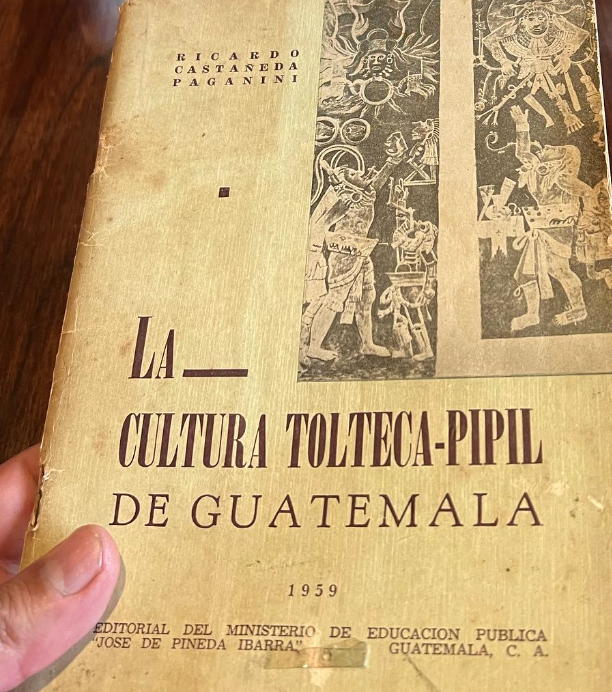
リカルド・カスタニェーダ・パガニーニ
Ricardo Castañeda Paganini

☆ リカルド・カスタニェーダ・パガニーニは、グアテマラの教育大臣で、グアテマラ国立図書館の館長の経験者。友人(?)のエクトル=ネリ・カスタニェーダの 著作"Autobiografía filosófica,"の中のpp.56-57に登場する。
Director de la Biblioteca Nacional de Guatemala: Ricardo Castañeda Paganini (1945-1948, 1957-1963)Guatemalan writer Ricardo Castañeda Paganini reading from his book, by Library of Congress, USA.
★エクトル=ネリ・カスタニェーダ
| Héctor-Neri Castañeda (December 13, 1924 – September 7, 1991[4]) | エクトル=ネリ・カスタニェーダ |
| Héctor-Neri
Castañeda (December 13, 1924 – September 7, 1991[4]) was a
Guatemalan-American philosopher and founder of the journal Noûs. Biography Born in San Vicente, Zacapa, Guatemala, he emigrated to the United States in 1948 and studied under Wilfrid Sellars at the University of Minnesota, where he earned a B.A. in 1950 and M.A. in 1952. Castañeda received his Ph.D. in June 1954 from the University of Minnesota for his dissertation The Logical Structure of Moral Reasoning. Sellars served as his doctoral advisor.[5] He studied at Oxford University from 1955–1956, after which he once again returned to the U.S. to take a sabbatical-replacement position in philosophy at Duke University. Castañeda is noted for his development of guise theory, which he applied to outstanding problems in the analysis of thought, language, and the structure of the world. He is also credited with the discovery of the "quasi-indexical". He died of a brain tumor in 1991. Academic career Following his brief stay at Duke University, Castañeda's first full-time academic appointment was as a professor in the Philosophy department at Wayne State University, where he taught from 1957–1969. It was there that he founded the philosophical journal Noûs, in 1967. From 1962–1963, he was also a visiting professor at the University of Texas at Austin. He was granted a fellowship from the Guggenheim Foundation between 1967 and 1968. He moved to Indiana University in 1969, and eventually became the Mahlon Powell Professor of Philosophy as well as that university's first Dean of Latino Affairs, a position he held from 1978–1981. He was a fellow at the Center for Advanced Study in the Behavioral Sciences from 1981–1982. Philosophical work Guise theory See also: Dual predication approach Castañeda started from the fact that thoughts about real things in the world are of a fundamentally similar nature to thoughts about things in the imagination, it is still a thought, and from there he hypothesized an entire realm of abstract objects (he calls it "abstractist ontology") that included both the real and the imagined.[3] He referred to these objects collectively as "guises", and argued that they could be treated as sets of properties. He went on to develop the guise theory of intentionality[6] and analyse all of language and perception in terms of these guises, ultimately developing an entire metaphysics based on them. One noted critic of guise theory was Alvin Plantinga, who developed his own rival theory involving a realm of abstract objects.[7][2] Both theories were in fact based on even earlier work developed by Alexius Meinong.[8][2] They differed, however, in the details of their metaphysical system and in how they regarded the basic building blocks of their respective systems. Castañeda's theory was temporarily undermined by the problem posed by Romane Clark's paradox, a paradox in naive predication theory.[9][10][11] Castañeda worked out a solution to block the paradox.[12][13] Deontic logic In deontic logic, Castañeda rejected Ross's paradox "on the grounds that the inference is only pragmatically odd in ways that are independently predictable by any adequate theory of the pragmatics of deontic language."[14][15] Quasi-indexical Castañeda introduced the concept of the quasi-indexical (or quasi-indicator), a linguistic device by which one person can attribute an indexical reference to another. His discussion on this matter strongly influenced John Perry's theory of indexicals, an influence which Perry acknowledged in the first footnote of the paper "The Problem of the Essential Indexical" (1979). Awards and honors In addition to his other academic honors, Castañeda received grants from the National Endowment for the Humanities, the Andrew W. Mellon Foundation, and the National Science Foundation. He served as president of the American Philosophical Association Central Division from 1979–1980, and was named to the American Academy of Arts and Sciences in 1990. Castañeda was awarded the Presidential Medal of Honor by the Government of Guatemala in 1991. |
エクトル=ネリ・カスタニェーダ(1924年12月13日 -
1991年9月7日[4])は、グアテマラ系アメリカ人の哲学者で、雑誌『ノウス』の創刊者。 略歴 1948年にアメリカに移住し、ミネソタ大学でウィルフリッド・セラーズに師事、1950年に学士号、1952年に修士号を取得。1954年6月、『道徳 的推論の論理構造』という論文でミネソタ大学から博士号を取得。1955年から1956年までオックスフォード大学で学んだ後、再びアメリカに戻り、 デューク大学でサバティカル休暇を利用して哲学の職に就いた[5]。カスタニェーダは、思考、言語、世界構造の分析における傑出した問題に応用したギース 理論の開発で知られる。また、「準指標」の発見者としても知られる。 1991年、脳腫瘍のため死去。 学者としてのキャリア デューク大学に短期間在籍した後、カスタニェーダはウェイン州立大学の哲学科教授として1957年から1969年まで教鞭をとった。そこで1967年に哲 学雑誌『Noûs』を創刊。1962年から1963年まで、テキサス大学オースティン校の客員教授も務めた。1967年から1968年にかけてグッゲンハ イム財団からフェローシップを受ける。 1969年にインディアナ大学に移り、最終的にマフロン・パウエル哲学教授となり、1978年から1981年まで同大学初のラテン系学部長を務めた。 1981年から1982年まで行動科学高等研究センターのフェロー。 哲学的業績 ギース理論 こちらも参照: 二重述語アプローチ カスタニエーダは、世界の現実的なものについての思考は、想像の中のものについての思考と基本的に似た性質を持っている、それはやはり思考である、という 事実から出発し、そこから現実と想像の両方を含む抽象的な対象(彼はそれを「抽象主義的存在論」と呼ぶ)の領域全体を仮定した[3]。さらに彼は意図性の ギーズ理論[6]を発展させ、言語と知覚のすべてをこれらのギーズの観点から分析し、最終的にはそれらに基づく形而上学全体を発展させた。 しかし、両者は形而上学的システムの詳細やそれぞれのシステムの基本的な構成要素をどのように考えているかにおいて異なっていた。 カスタニェーダの理論は、素朴述語理論におけるパラドックスであるロマネ・クラークのパラドックスによってもたらされた問題によって一時的に弱体化した [9][10][11]。カスタニェーダはパラドックスを阻止する解決策を考案した[12][13]。 脱論理学 デオンティック論理学において、カスタニェーダはロスのパラドックスを「デオンティック言語の語用論に関する適切な理論によって独立に予測可能な方法にお いてのみ、推論が語用論的に奇妙であるという理由で」否定した[14][15]。 準指標的 カスタニェーダは準指標(または準指標)という概念を導入した。この問題についての彼の議論は、ジョン・ペリーの索引理論に強い影響を与え、その影響をペ リーは論文 "The Problem of the Essential Indexical" (1979)の最初の脚注で認めている。 受賞と栄誉 その他の学術的栄誉に加え、カスタニェーダは全米人文科学基金、アンドリュー・W・メロン財団、全米科学財団から助成金を受けた。1979年から1980 年までアメリカ哲学協会中央部の会長を務め、1990年にはアメリカ芸術科学アカデミーの会員に選ばれた。1991年にはグアテマラ政府から大統領名誉勲 章を授与された。 |
| Select publications "On the Semantics of the Ought-to-Do", Synthese, 21, 3/4, Semantics of Natural Language, 1970, pp. 449–468. "Intentions and the Structure of Intending", The Journal of Philosophy, 68, 1971, pp. 453–466. The Structure of Morality, Springfield: Thomas, 1974. Thinking and Doing. The Philosophical Foundations of Institutions, Dordrecht, Reidel, 1975. On Philosophical Method, Detroit: Nous publications, 1980. "The Paradoxes of Deontic Logic: The Simplest Solution to All of Them in One Fell Swoop", in Risto Hilpinen (ed.), New Studies in Deontic Logic, Dordrecht: Reidel, 1981, pp. 37–85. Thinking, Language and Experience, Minneapolis: University of Minnesota Press, 1989. The Phenomeno-Logic of the I. Essays on Self-consciousness, edited by James G. Hart and Tomis Kapitan, Bloomington: Indiana University Press, 1999. Sprache und Erfahrung. Texte zu einer neue Ontologie (Eingeleitet und übersetzt von Helmut Pape), Frankfurt a.M.: Suhrkamp, 1982. |
主な著作 「すべきことの語用論について」、『シンテーズ』21巻3/4号、自然言語の語用論特集、1970年、449–468頁。 「意図と意図の構造」、『哲学ジャーナル』68巻、1971年、453–466頁。 『道徳の構造』スプリングフィールド:トーマス社、1974年。 『思考と行為。制度の哲学的基礎』ドルドレヒト:ライデル社、1975年。 『哲学的方法について』デトロイト:ヌース出版、1980年。 「義務論的論理のパラドックス:それら全てを一挙に解決する最も単純な方法」、『義務論的論理の新研究』所収、リスト・ヒルピネン編、ドルドレヒト:ライデル社、1981年、pp. 37–85。 『思考、言語、経験』、ミネアポリス:ミネソタ大学出版局、1989年。 『自我の現象論理学。自己意識に関する論考』ジェームズ・G・ハート、トミス・カピタン編、ブルーミントン:インディアナ大学出版局、1999年。 『言語と経験。新たな存在論へのテキスト』(ヘルムート・パーペによる序文と訳)、フランクフルト・アム・マイン:スールカンプ、1982年。 |
| https://en.wikipedia.org/wiki/H%C3%A9ctor-Neri_Casta%C3%B1eda |
リ ンク
文 献
そ の他の情報
Copyleft, CC, Mitzub'ixi Quq Chi'j, 1996-2099
☆ ☆
☆